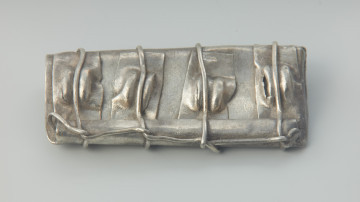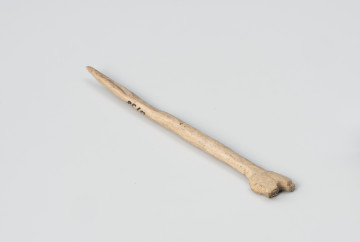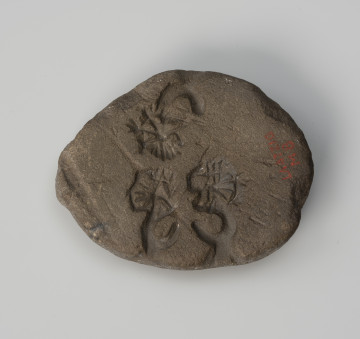
Captorga
1000 — 1100
National Museum in Szczecin
Part of the collection: Middle Ages
The treasure from which the silver kaptorga comes was discovered by the road running from Laski to Dramina, the Kamień district, in 1900. It was found while clearing trees in a forest. The clay pot contained over 11 kg of coins and ornaments. Currently, in the museum collection, there are only six Arab coins and fragments of silver jewellery weighing approximately 550 g, including more than 40 items of kaptorga. It is most often assumed that silver kaptorga, i.e. containers for amulets, relics, medicines or perfume, were foreign products, and their origins can be traced back to Asia Minor, from where they were supposed to have made their way to Europe via Byzantium, to the areas under Carolingian rule. There are opinions about the connections between these objects and Western European Pre-Roman and Romanesque art in the subject literature. The source of inspiration for creating these small containers may have been their large counterparts - reliquaries popular in medieval culture. In Byzantium, on the other hand, small pouches made of metal wires were worn on necks, concealing various types of amulets. On this basis, it is believed that the Slavs also carried various trinkets, including natural ones, such as cereal grains, wax or pieces of bone, and man-made ones, for example, fragments of cloth or glass beads. Placing such objects in hoods and wearing them around the neck was related to the system of beliefs adopted by the Slavs and the belief in the apotropaic power of various types of amulets. The ornamentation of the surface made them also an attractive element of a costume. A separate issue is the nature of the ornament and the symbolic content it contained.
Anna Bogumiła Kowalska
Author / creator
Dimensions
cały obiekt: height: 2.2 cm, width: 3.4 cm
Object type
adornment
Technique
filigree, casting, hand made, individual
Material
silver
Creation time / dating
Owner
Muzeum Narodowe w Szczecinie
Identification number
Location / status

1000 — 1100
National Museum in Szczecin

800 — 1200
National Museum in Szczecin

701 — 1150
National Museum in Szczecin
DISCOVER this TOPIC
National Museum in Lublin
DISCOVER this PATH
Educational path